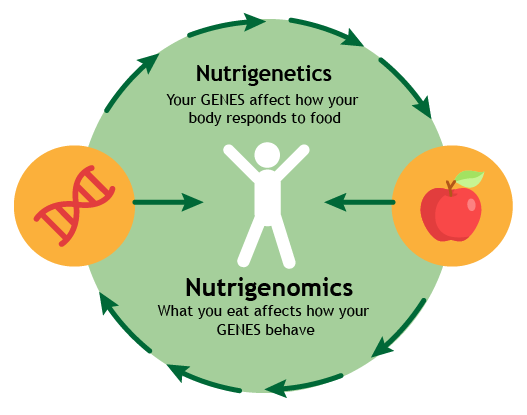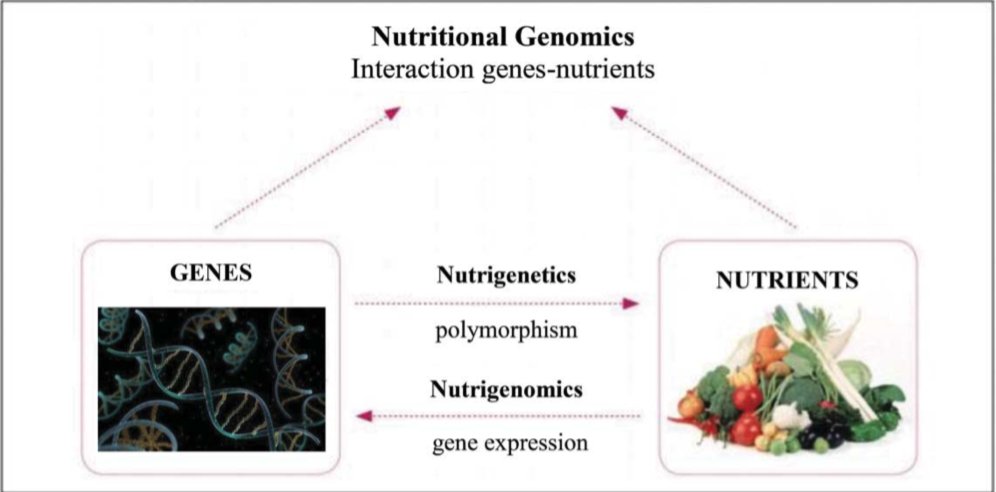
Nutrigenomics can be defined as the study of the interaction between genes and the nutritional environment.1 Such a field has been proposed as a new model in healthcare in which genotyping (studying the differences in gene make-up of one individual and comparing it to other individuals) can help determine the best choices of foods and supplements for a particular person.1(592) Such an approach is thought to optimize an individual’s health and prevent or manage metabolic diseases. The following will consider nutrigenomics in greater detail.
Nutrigenomics can be further appreciated by outlining its basic tenets, according to Lord and Bralley1(592):
1. improper diets are risk factors for diseases that are chronic in nature
2. some dietary substances alter gene expression/genome structure
3. genetic make-up and diet interact and influence individuals’ health
4. genes are regulated by diet and can influence disease and progression
5. nutritional interventions based on nutritional requirements/nutritional status/genotype can help optimize an individual’s health and mitigate/manage disease.
A distinction might be made between nutrigenomics and nutrigenetics; nutrigenetics is a process where focus is placed upon how genetic variants affect nutrient status or metabolism, while nutrigenomics (as seen previously) focuses on the effect of nutrients/food on gene expression and health.2 Phenylketonuria (PKU) is a condition where a variant in a gene, that normally encodes the phenylalanine hydroxylase enzyme, disrupts the function of said enzyme. Such a gene variant inhibits the successful conversion of phenylalanine to tyrosine; an amino acid critical for the production of neurotransmitters.2(1613) Said approach is an example of nutrigenetics. Please see illustration below from Pena-Romero et al3:

Essentially, genes and the environment (i.e., diet, lifestyle, pollution) participate in the expression of observable characteristics (phenotype). Of all environmental factors, diet plays the largest role, since it is something individuals are frequently exposed to, and a factor which is easily modifiable.3(3031)Nutrition has the greatest relevance in classic metabolic diseases such as PKU, galactosemia, and congenital hyperhomocystemia; such conditions can be manipulated by appropriate and targeted nutritional interventions to include low diets in galactose, phenylalanine or rich diets in folic acid, respectively.3(3031)However, such interventions would be nearly impossible if identifying genetic variations was omitted. Although many chronic diseases are manifested by multiple factors, personalized nutrition does have the capacity to facilitate positive outcomes.
In conclusion, nutrigenomics studies the interactions between genes and the nutritional environment, which can help determine the best foods/supplement choices for each individual. Such precise analysis allows for personalized nutrition, enabling individuals the opportunity to improve their health, performance, and longevity in a meaningful and effective manner.
References
1. Lord RS, Bralley, JA. Laboratory Evaluations for Integrative and Functional Medicine 2nd ed. Duluth, GA: Genova Diagnostics; 2012.
2. Hanson J, Stadler D. Nutritional genomics: Exploration of personal genetic testing in the classroom. J Acad Nutr Diet. 2019;119(10):1613-1617. doi:10.1016/j.jand.2019.02.011.
3. Pena-Romero AC, Navas-Carillo D, Marin F, et al. The future of nutrition: Nutrigenomics and nutrigenetics in obesity and cardiovascular disease. Crit Rev Food Sci Nutr. 2018;58(17):3030-3041. doi:https://doi-org.libproxy.bridgeport.edu/10.1080/10408398.2017.1349731.
-Michael McIsaac
